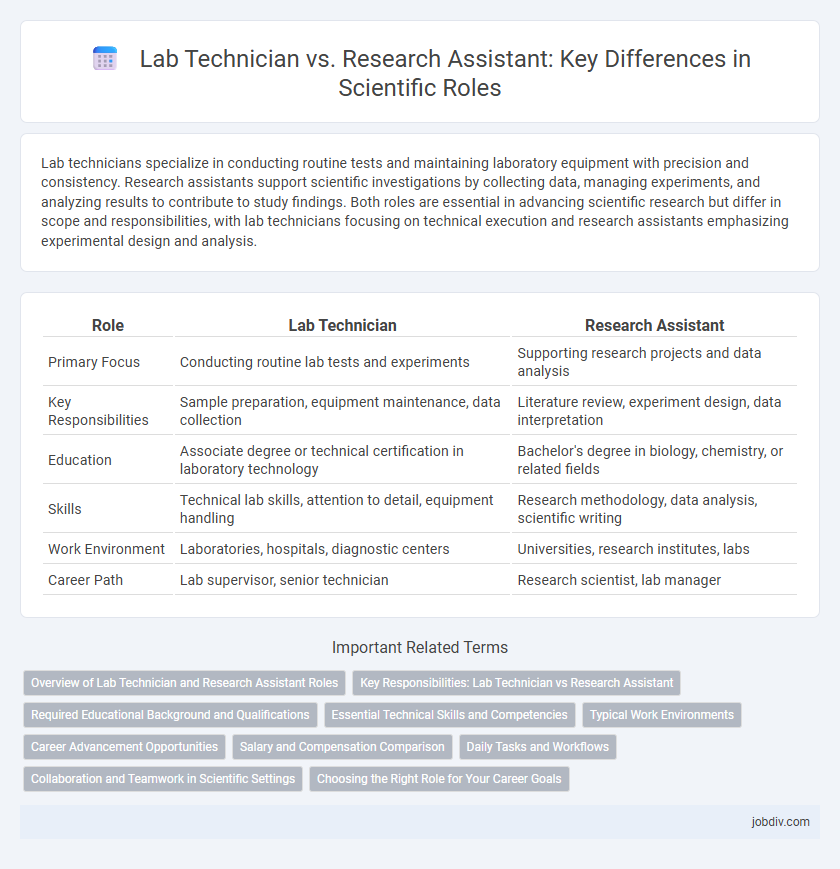Lab technicians specialize in conducting routine tests and maintaining laboratory equipment with precision and consistency. Research assistants support scientific investigations by collecting data, managing experiments, and analyzing results to contribute to study findings. Both roles are essential in advancing scientific research but differ in scope and responsibilities, with lab technicians focusing on technical execution and research assistants emphasizing experimental design and analysis.
Table of Comparison
| Role | Lab Technician | Research Assistant |
|---|---|---|
| Primary Focus | Conducting routine lab tests and experiments | Supporting research projects and data analysis |
| Key Responsibilities | Sample preparation, equipment maintenance, data collection | Literature review, experiment design, data interpretation |
| Education | Associate degree or technical certification in laboratory technology | Bachelor's degree in biology, chemistry, or related fields |
| Skills | Technical lab skills, attention to detail, equipment handling | Research methodology, data analysis, scientific writing |
| Work Environment | Laboratories, hospitals, diagnostic centers | Universities, research institutes, labs |
| Career Path | Lab supervisor, senior technician | Research scientist, lab manager |
Overview of Lab Technician and Research Assistant Roles
Lab Technicians primarily handle laboratory equipment, prepare samples, and conduct routine tests to support experimental workflows. Research Assistants assist scientists by collecting data, performing experiments, and managing project documentation within research studies. Both roles are essential in scientific research environments, contributing to accurate data collection and experimental reliability.
Key Responsibilities: Lab Technician vs Research Assistant
Lab Technicians primarily handle routine laboratory tasks such as sample preparation, equipment maintenance, and data recording to ensure accurate experimental results. Research Assistants support scientific investigations by designing experiments, analyzing data, and contributing to research publications under the guidance of principal investigators. Both roles require strong technical skills but differ in their involvement with experimental design and data interpretation.
Required Educational Background and Qualifications
Lab Technicians typically require an associate degree or a certificate in laboratory technology, emphasizing practical skills in specimen collection, equipment operation, and basic data analysis. Research Assistants often hold a bachelor's degree in biology, chemistry, or a related scientific field, with strong backgrounds in experimental design, data interpretation, and scientific reporting. Both roles demand proficiency in laboratory protocols and safety standards, but Research Assistants are generally expected to have a deeper understanding of theoretical concepts and research methodologies.
Essential Technical Skills and Competencies
Lab Technicians excel in operating and maintaining laboratory equipment, performing routine tests, and adhering to standardized protocols with precision. Research Assistants demonstrate strong competencies in experimental design, data analysis using statistical software, and literature review to support hypothesis formulation. Both roles require proficiency in laboratory safety, sample preparation, and accurate documentation, but Research Assistants often engage more deeply in data interpretation and scientific reporting.
Typical Work Environments
Lab Technicians typically work in controlled laboratory settings within hospitals, chemical plants, or pharmaceutical companies, handling routine analyses and equipment maintenance. Research Assistants often operate in academic institutions or research organizations, engaging in experimental design, data collection, and scientific investigations. Both roles require adherence to safety protocols but differ in the complexity and scope of their work environments.
Career Advancement Opportunities
Lab technicians typically advance by gaining specialized technical certifications and mastering advanced laboratory equipment, enhancing their qualifications for senior technician roles or supervisory positions. Research assistants often progress by contributing to published studies, acquiring research skills, and pursuing higher academic qualifications such as a master's or doctoral degree, which opens pathways to principal investigator or project manager roles. Both career paths benefit from continuous professional development, networking within scientific communities, and involvement in grant writing or collaborative research projects to increase career advancement opportunities.
Salary and Compensation Comparison
Lab Technicians typically earn an average annual salary ranging from $40,000 to $60,000, while Research Assistants' salaries generally fall between $35,000 and $55,000, depending on experience and location. Benefits for both roles often include health insurance, retirement plans, and potential bonuses, with Lab Technicians sometimes receiving higher compensation due to specialized technical skills. Salary variations are influenced by industry, educational qualifications, and geographic region, emphasizing the need for role-specific market analysis.
Daily Tasks and Workflows
Lab Technicians handle routine experimental setups, equipment calibration, sample preparation, and data collection to maintain smooth laboratory operations. Research Assistants support project design, conduct specialized experiments, analyze complex datasets, and document findings for scientific publications. Both roles require proficiency in laboratory safety protocols, meticulous record-keeping, and effective collaboration with principal investigators and research teams.
Collaboration and Teamwork in Scientific Settings
Lab Technicians and Research Assistants play complementary roles in scientific settings, where effective collaboration and teamwork are crucial for experimental success. Lab Technicians focus on maintaining laboratory equipment, preparing samples, and ensuring compliance with safety protocols, enabling Research Assistants to concentrate on data collection and analysis. Strong communication and coordinated efforts between these professionals enhance project efficiency, accuracy, and the overall quality of scientific research.
Choosing the Right Role for Your Career Goals
Choosing between a Lab Technician and a Research Assistant depends on your long-term career goals within the scientific field. Lab Technicians primarily focus on maintaining laboratory equipment, conducting routine tests, and ensuring experimental accuracy, making it ideal for those interested in hands-on technical skills. Research Assistants engage more deeply with experimental design, data analysis, and literature review, providing a stronger foundation for pursuing advanced research roles or graduate studies.
Lab Technician vs Research Assistant Infographic

 jobdiv.com
jobdiv.com